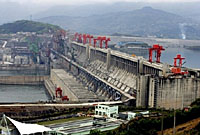




China plans to double its reliance on hydroelectric power, but experts say the government is likely to encounter resistance as millions of citizens face relocation to make way for more dams.
In an Oct. 6 analysis titled “China Looks to Energy Independence,” China’s official Xinhua news service suggested that China should rely more heavily on hydropower and ther “alternative or renewable energies” for its future energy needs.
China’s many rivers provide the country with ample water resources for power generation. But the State Council-affiliated China Academy of Engineering last year estimated that only 24 percent of China’s hydroelectric resources have been utilized, pointing to new projects that will raise that rate to 40 percent by 2010 under the current Five-Year Plan.
China Strategic Advisory, a New York-based consulting firm, meanwhile noted in a study earlier this year that over 23 million Chinese citizens have already been displaced by the building of dams and reservoirs.
The controversial Three Gorges Dam project alone has forced the displacement of at least 1.2 million people. On October 11, Chongqing Vice Mayor Yu Yuanmu told Xinhua that 4 million more residents of the extended municipality will have to be moved in the next 10 to 15 years.
At a conference last month in Wuhan, officials acknowledged a series of problems with the Three Gorges Dam that could lead to a “catastrophe,” according to Xinhua . Erosion and landslides around the dam’s huge reservoir have already killed at least 28 farmers, fishermen, and villagers, the Wall Street Journal reported in August.
Buildups of algae, sewage, and silt also followed completion of the project this year.
In an interview with Radio Free Asia, Philip Andrews-Speed, a China energy expert at the University of Dundee in Edinburgh, Scotland, said that China’s plans to build more dams are likely to encounter opposition.
“They’re controversial around the world, and increasingly in China,” Philips-Speed said.
“You have had local communities demonstrating against new projects, [and] in the last three or four weeks we’ve heard some quite horrifying reports of environmental impacts in and around the Three Gorges Dam. So, yes, the idea that the government can just easily move ahead and address its energy problems through building lots of dams really is a non-starter.”
Philips-Speed said that Chinese communities are resisting “more and more” the forced migration and change of lifestyle that accompany major dam-building.
“The Chinese government is going to find it more and more difficult to deal with the social pressures against the dams, as well as dealing with the environmental consequences.”
Daniel Rosen—an energy expert and principal at the New York-based China Strategic Advisory consulting firm—said that while China’s coal-burning has drawn international criticism because of the resulting air pollution, China’s planned hydropower projects will also have international effects.
“Much of the remaining hydro opportunity for China lies in remote highland areas of Yunnan Province in the Tibetan plateau area which are less crowded, more sparsely populated, but also entail river systems that flow not just within China’s borders but are critical for other countries on China’s periphery.”
“Hydro is simply not an easy answer to China’s problems,” Rosen said.
Rosen said that the Oct. 6 Xinhua article on China’s energy policy appears to be based on the false assumption that China can achieve energy independence without imports.
“It’s not any more possible for China than it is for the United States. Nobody’s really going to be energy-independent among the big continental economies like the U.S. and China.”
Original reporting by Michael Lelyveld. Edited for the Web by Richard Finney.